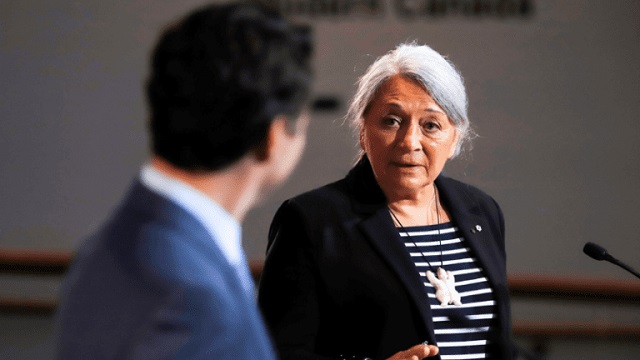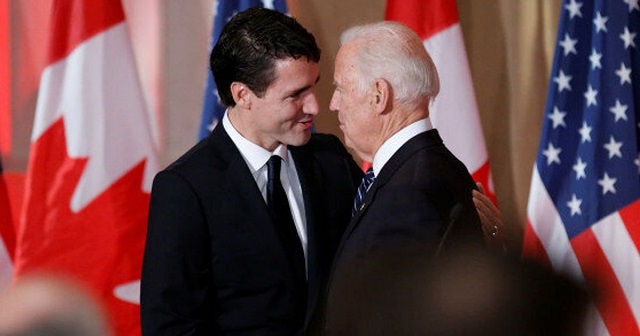MacDonald Laurier Institute
It’s time for a grown-up conversation on immigration

From the MacDonald Laurier Institute
Rapid population growth makes Canada’s most pressing challenges harder to manage.
Canada has been shaped by large-scale immigration. With the exception of Indigenous Peoples, the vast majority of Canadians today are either immigrants or descendants thereof. Our nation has thrived as a pluralistic and multiethnic society, built through the gradual integration of people from around the world.
While this is largely a good news story it should not obscure a hard truth: in the 21st century, the challenges associated with immigration are vastly different from those of 50 or 100 years ago, and until recently policymakers have been unwilling to discuss immigration policy accordingly. These challenges can be broadly categorized into three areas: economic impact; infrastructure capacity; and cultural friction.
When it comes to economic impact, immigration has historically, on balance, been beneficial to Canada’s economy and standard of living. But in recent years the evidence has become more mixed. In particular, the sheer number of new arrivals—over one million in 2022 alone—especially in the form of temporary and lower-skilled migrants, is increasingly being used as a substitute for Canadian labour, driving down wages. This downward pressure, while good news for employers trying to contain costs, has the dual effect of dragging down per-capita GDP, while disincentivizing business investment in labour-productivity-enhancing innovations.
The cause of the jump in total migrants per year is also no secret: there has been an explosion in the number of international postsecondary students studying in Canada over the last decade—jumping from 248,000 in 2012 to 807,000 in 2022—largely as a result of postsecondary institutions seeking a more lucrative income stream since they are able to charge international students much higher fees. With no annual cap on foreign student visas, this has effectively become a massive back-door entry loophole to get into the country. Many of these students arrive with the hope of becoming permanent residents, which also entitles them to sponsor family members to come to Canada, further boosting migration levels.
Equally concerning has been the effect of this population growth on housing prices, which is a straightforward arithmetic function of supply and demand. Canada has some of the most expensive housing in the world, overwhelmingly a result of insufficient housing supply, especially in major cities. High levels of immigration, also concentrated in these cities, exacerbate the problem from the demand side. Both Canadians and newcomers suffer if they cannot afford a place to live. Similarly, many Canadians are unable to find a family doctor and face crowded schools, transit, hospitals, or other crumbling infrastructure. Rapid population growth makes these challenges harder to manage.
But, while concerns about immigration’s impact on our economy and infrastructure have slowly begun to attract more attention and public discussion, the issue of cultural friction remains largely taboo.
It should be said that historically, Canada has been fairly successful at integrating people from diverse religious, linguistic, and racial backgrounds, and even today there is a strong case that Canada manages these challenges better than most other countries. What was once a fairly organic process that allowed for integration over years, if not generations, has been supplanted by activist government policy that preaches an official doctrine of big-M Multiculturalism, which fetishizes and subsidizes cultural differences while simultaneously erasing and downplaying Canadian history. In effect, the implicit social contract between Canada and newcomers has become unbalanced. Canada is and should remain a place where newcomers are free to retain their religion, language, and culture. But we must also actively invite all Canadians, new and old, to join a shared national project to ensure we are working towards living together rather than simply side by side.
In addition to counterproductive government policies, few have noted that the integration process has been dramatically changed by technological advance which now allows for immigrants to retain permanent, real-time cultural ties to their native countries. This phenomenon—where people can be physically present in one place but maintain daily cultural and social ties to their homeland—presents a special challenge to a country with a relatively weak national identity. This is particularly true of Canada’s large diaspora communities, including those from China, India, and Iran, which have increasingly impacted Canada’s international relationships and given rise to interference (alleged or proven) by these countries on Canadian soil.
Canada has historically enjoyed strong support for immigration across the political spectrum, a consensus that is not common in other countries. Recent opinion polling suggests that this consensus is rapidly eroding, if not already gone. We are long overdue for an honest, constructive, and robust debate about the way forward on immigration. We owe it to Canadians—both present and future.
Aaron Wudrick is the domestic policy director at the Macdonald-Laurier Institute.
Business
Proposed changes to Canada’s Competition Act could kneecap our already faltering economy

From the Macdonald Laurier Institute
Aaron Wudrick, for Inside Policy
No party wants to be seen as soft on “big business” but that is a bad reason to pass potentially harmful, counterproductive competition policy legislation.
The recent federal budget was widely panned – in particular by the entrepreneurial class – for its proposal to raise the capital gains inclusion rate. As it turns out, “soak the rich” might sound like clever politics (it’s not) but it’s definitely a poor narrative if your goal is to incentivize and encourage risk-taking and investment.
But while this damaging measure in the federal budget has at least drawn plenty of public ire, other harmful legislative changes are afoot that are getting virtually no attention at all. They’re contained in Bill C-59 – the omnibus bill still wending its way through Parliament to enact measures contained in last fall’s economic statement – and consist of major proposed amendments to Canada’s Competition Act. The lack of coverage and debate on these changes is all the more concerning given that, if enacted, they could have a long-term negative impact on our economy comparable to the capital gains inclusion rate hike.
Worst of all, the most potentially damaging changes weren’t even in the original bill, but were brought forward by the NDP at the House of Commons Standing Committee on Finance, and are lifted directly from a previous submission made to the committee by the Commissioner of Competition himself. In effect, they would change competition law to put a new onus on businesses to prove a negative: that having a large market share isn’t harmful to consumers.
MPs on the committee have acknowledged they don’t really understand the changes – they involve a “concentration index” described as “the sum of the squares of the market shares of the suppliers or customers” – but the government itself previously cast doubt on the need for this additional change. It’s obvious that a lot of politics are at play here: no party wants to be seen as soft on “big business.” But this is about much more than “big business.” It’s about whether we want to enshrine in law unfounded, and potentially very harmful, assumptions about how competition operates in the real world.
The changes in question are what are known in legal circles as “structural presumptions” – which, as the name implies, involve creating presumptions in law based on market “structure” – in this case, regarding the concentration level of a given market. Presumptions in law matter, because they determine which side in a competition dispute – the regulatory authority, or the impugned would-be merging parties – bears the burden of proof.
So why is this a bad idea? There are at least three reasons.
First of all, the very premise is faulty: most economists consider concentration measures alone (as opposed to market power) to be a poor proxy for the level of competition that prevails in a given market. In fact, competition for customers often increases concentration.
This may strike most people as counterintuitive. But because robust competition often leads to one company in particular offering lower prices, higher quality, or more innovative products, those who break from the pack tend to attract more customers and increase their market share. In this respect, higher concentration can actually signal more, rather than less, competition.
Second, structural presumptions for mergers are not codified in the US or any other developed country other than Germany (and even then, at a 40 percent combined share rather than 30 percent). In other words, at a time when Canada’s economy is suffering from the significant dual risks of stalled productivity growth and net foreign investment flight, the amendments proposed by the NDP would introduce one of the most onerous competition laws in the world.
There is a crucial distinction between parliamentarians putting such wording into legislation – which bind the courts – and regulatory agencies putting them in enforcement guidelines, which leave courts with a degree of discretion.
Incorporating structural presumptions into legislation surpasses what most advanced economies do and could lead to false negatives (blocking mergers that would, if permitted, actually benefit consumers), chill innovation (as companies seeking to up their game in the hopes of selling or merging are deterred from even bothering), and result in more orphaned Canadian businesses (as companies elect not to acquire Canadian operations on global transactions).
Finally, the impact on merger review will not be a simplification but will likely just fetter the discretion and judgment of the expert and impartial Competition Tribunal in determining which mergers are truly harmful for consumers and give more power to the Competition Bureau, the head of which is appointed by the federal Cabinet. Although the Competition Bureau is considered an independent law enforcement agency, it must still make its case before a court (the Tribunal, in this case).The battleground at the Tribunal will shift from focusing on the likely effect of the merger on consumers to instead entertaining arguments between the Bureau’s and companies’ opposing arguments about defining the relevant market and shares.
Even if, after further study, the government decided that rebuttable structural presumptions are desirable, C-59 already repeals subsection 92(2) of the Competition Act, which allows the Tribunal to develop the relevance of market shares through case law – a far better process than a blanket rule in legislation. Nothing prevents the Bureau from incorporating structural presumptions as an enforcement screen for mergers in its guidelines, which is what the United States has done for decades, rather than putting strict (and therefore inflexible) metrics into statute and regulations.
No one disputes that Canada needs a healthy dose of competition in a wide range of sectors. But codifying dubious rules around mergers risks doing more harm than good. In asking for structural presumptions to be codified, the Competition Bureau is missing the mark. Most proposed mergers that will get caught by these changes should in fact be permitted on the basis that consumers would be better off – and the uncertainty of being an extreme outlier on the global stage in terms of competition policy will create yet another disincentive to start and grow businesses in Canada.
This is the opposite of what Canada needs right now. Rather than looking for ill-advised shortcuts that entangle more companies in litigation and punt disputes about market definition rather than effects to the Tribunal, the Bureau should be focusing on doing its existing job better: building evidence-backed cases against mergers that would actually harm Canadians.
Aaron Wudrick is the domestic policy director at the Macdonald-Laurier Institute.
MacDonald Laurier Institute
The Governor General deserves better, but we deserve impartiality

From the Macdonald Laurier Institute
By Philippe Lagassé
Mary Simon’s impartiality was undermined by hosting a symposium tied to controversial government legislation.
Mary Simon has been a guarded Governor General. She’s adopted a low profile since her appointment, performing her vice-regal responsibilities without much notice. When she has been in the news, it’s usually because of her efforts to learn French and costly diplomatic trips, not on account of an initiative she’s launched or a stance she’s taken. Aside from routine public statements and some championing of Indigenous reconciliation, Simon hasn’t tried to make a mark. Until last week, that is.
On April 11, Her Excellency hosted a symposium on online abuse and creating safe digital spaces. Simon has been the target of vitriol on social media, a reality she shares with many public figures, particularly women. She wants to address this problem, stressing that “we deserve better.” As far as causes go, this is a laudable one. Online abuse is a serious issue, one that can excuse and encourage physical violence and attacks. To highlight the severity of the challenge, the Governor General’s symposium featured well-known Canadians who’ve also suffered from online abuse and are determined to fight it.
Unfortunately, the Governor General’s symposium took place while a government bill on online harms is making its way through Parliament. Bill C-63, the Online Harms Act, has been the source of significant controversy, notably around its impact on free expression and the potential life sentences it imposes on certain types of hateful speech. C-63 has been criticized by law professors, civil liberties advocates, and the Conservative Party. While there may be a general consensus that online abuse is a scourge, the solution is contentious, and Bill C-63 has been the subject of serious debate.
As well-intentioned as the Governor General’s symposium was, she should never have hosted it in this context, a conclusion that’s reinforced by the Minister of Justice publicly tying the event to bill C-63. As soon as the government tabled the bill, Her Excellency should have understood that the symposium was no longer appropriate and would present a risk to her office’s impartiality.
The Governor General is the second highest office of the Canadian state, right under the King. As the King’s vice-regal representative, the Governor General performs core constitutional functions. These demand that the Governor General not only act impartially but be perceived to be impartial. This isn’t just good form, it’s a fundamental part of the job.
As part of their constitutional role, Governors General exercise the Crown’s reserve powers. These include the granting of royal assent to legislation on the advice of the houses of Parliament, proroguing and dissolving Parliament on the advice of the Prime Minister, and inviting a party leader to form a new government when the serving Prime Minister resigns. Impartiality helps shield the Governor General from partisan attacks when exercising these powers and maintains public trust in the office.
Now, to be clear, the Governor General has very limited discretion in exercising these reserve powers. As long as the Prime Minister’s party holds the confidence of the House of Commons, the Governor General must almost always accept their advice. Yet, there have been and will be cases where vice-regal representatives exercise their discretion to decide the fates of governments or guard against unconstitutional abuses of power. When these occur, we need the Governor General to be respected as a non-partisan, politically neutral office. Doubts about a Governor General’s impartiality undermine her or his constitutional functions and can weaken trust in the office when it’s most needed.
Turning back to the symposium, it’s important to clarify why it undermined her impartiality, or at least perceptions of it. Defenders of the symposium have argued that the event didn’t feature any members of the government as speakers, hence it wasn’t partisan or meant to endorse the Online Harms Act. Suffice to say, had ministers spoken at the event, we would be dealing with an outright constitutional debacle, not just concerns about vice-regal impartiality. A full-on violation of constitutional norms isn’t the standard here. Instead, we should be asking why the Minister of Justice was even there, and why the Governor General decided to host the symposium, considering how contentious Bill C-63 has been already. Hosting the event allowed Her Excellency to get pulled into the partisan fray, a predictable outcome that she shouldn’t have risked.
Those who participated in the symposium will counter that it was the Minister of Justice who made the connection with Bill C-63, not the Governor General. Her Excellency’s motives, and the importance of the cause addressed by the symposium, shouldn’t be impugned by a careless, partisan tweet. Alas, partisans are going to partisan and politicians are going to politick. This is precisely why vice-regal representatives should avoid wading into politically charged topics. Expecting politicians to show restraint and respect the neutrality of the office of the Governor General is more than a tad naive. Vice-regal representatives should have the wherewithal to avoid situations where their office can be leveraged for partisan purposes.
Defenders of the symposium offer another argument: as the sovereign’s representative, the Governor General should address important social problems that affect Canadians. The vice-regal role shouldn’t be confined to constitutional functions, ceremonies, and commemorations. Not allowing vice-regal representatives to advocate for the public good would be a lost opportunity. This is a fair point, though Governors General need to be careful about what causes they take up. When it comes to vice-regal advocacy, banal benevolence is the way to go. Anything that’s the subject of notable partisan and parliamentary debate, is ideologically fraught, or might be fought over during an election should raise red flags.
Thankfully for the Governor General, the controversy surrounding her symposium hasn’t extended beyond the Ottawa bubble yet. She should keep it that way by abandoning her “We Deserve Better” campaign while partisans battle it out over Bill C-63 and the courts review the Online Harms Act if it becomes law.
This isn’t because the Governor General doesn’t deserve better; she does, as do all those who suffer online abuse. It’s because Canadians deserve impartiality from the Governor General, both real and perceived.
Philippe Lagassé is an associate professor at Carleton University. He’s the co-editor of Canada and the Crown: Essays on Constitutional Monarchy (2014) and The Crown and Parliament(2015).
-

 Education2 days ago
Education2 days agoRDCRS celebrates Gillian Hallam as 2024 CCSSA Excellence in Catholic Education Award recipient
-

 COVID-192 days ago
COVID-192 days agoElon Musk’s X will help fund COVID shot critic’s ongoing legal battle against Canadian university
-

 COVID-192 days ago
COVID-192 days agoQuebec microbiology professor fired for his public opposition to COVID shots
-

 COVID-192 days ago
COVID-192 days agoAstraZeneca withdraws COVID vaccines worldwide amid lawsuits alleging severe harm
-

 COVID-191 day ago
COVID-191 day agoBritish MP Andrew Bridgen gives powerful speech on ‘scandal’ of excess deaths after COVID jab rollout
-

 Fraser Institute1 day ago
Fraser Institute1 day agoPolicymakers in Ottawa and Edmonton maintain broken health-care system
-

 MAiD20 hours ago
MAiD20 hours agoEven Canadian leftists are starting to recognize the ‘dystopian’ nature of MAiD
-

 Censorship Industrial Complex20 hours ago
Censorship Industrial Complex20 hours agoElon Musk skewers Trudeau gov’t Online Harms bill as ‘insane’ for targeting speech retroactively







